Roberts A.D. The Cambridge History of Africa, Volume 7: from 1905 to 1940
Подождите немного. Документ загружается.

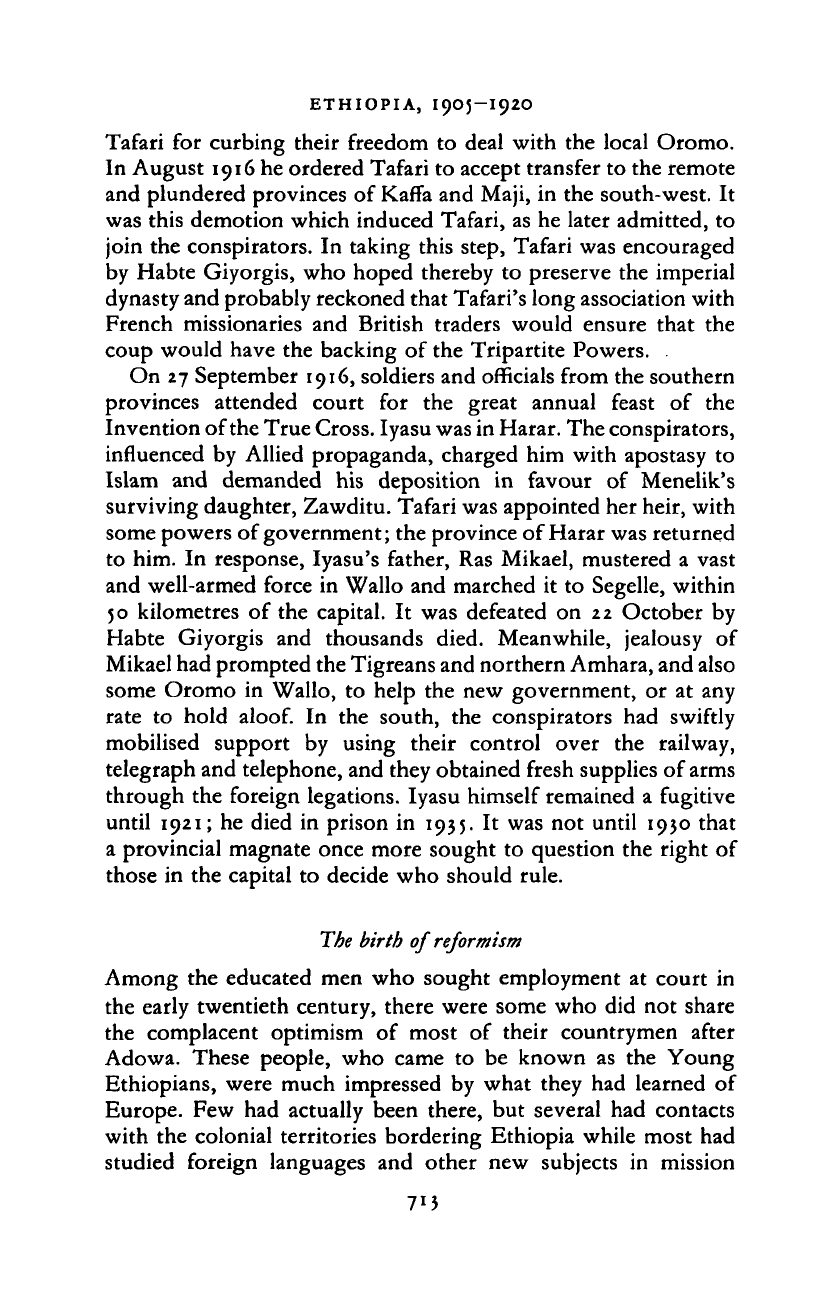
ETHIOPIA, 1905-1920
Tafari
for
curbing their freedom
to
deal with the local Oromo.
In August 1916 he ordered Tafari to accept transfer to the remote
and plundered provinces of Kaffa and Maji, in the south-west.
It
was this demotion which induced Tafari, as he later admitted,
to
join the conspirators.
In
taking this step, Tafari was encouraged
by Habte Giyorgis, who hoped thereby
to
preserve the imperial
dynasty and probably reckoned that Tafari's long association with
French missionaries and British traders would ensure that
the
coup would have the backing
of
the Tripartite Powers.
On 27 September 1916, soldiers and officials from the southern
provinces attended court
for the
great annual feast
of the
Invention of the True
Cross.
Iyasu was in Harar. The conspirators,
influenced by Allied propaganda, charged him with apostasy
to
Islam
and
demanded
his
deposition
in
favour
of
Menelik's
surviving daughter, Zawditu. Tafari was appointed her heir, with
some powers of government; the province of Harar was returned
to him.
In
response, Iyasu's father, Ras Mikael, mustered
a
vast
and well-armed force
in
Wallo and marched
it
to Segelle, within
50 kilometres
of
the capital.
It
was defeated
on
22 October
by
Habte Giyorgis
and
thousands died. Meanwhile, jealousy
of
Mikael had prompted the Tigreans and northern Amhara, and also
some Oromo
in
Wallo,
to
help the new government,
or at
any
rate
to
hold
aloof.
In the
south,
the
conspirators
had
swiftly
mobilised support
by
using their control over
the
railway,
telegraph and telephone, and they obtained fresh supplies of arms
through the foreign legations. Iyasu himself remained
a
fugitive
until 1921; he died
in
prison
in
1935.
It
was not until 1930 that
a provincial magnate once more sought
to
question the right of
those
in
the capital
to
decide who should rule.
The birth of
reformism
Among the educated men who sought employment
at
court
in
the early twentieth century, there were some who did not share
the complacent optimism
of
most
of
their countrymen after
Adowa. These people, who came
to be
known
as the
Young
Ethiopians, were much impressed
by
what they had learned
of
Europe. Few had actually been there, but several had contacts
with the colonial territories bordering Ethiopia while most had
studied foreign languages
and
other new subjects
in
mission
7
1
?
Cambridge Histories Online © Cambridge University Press, 2008
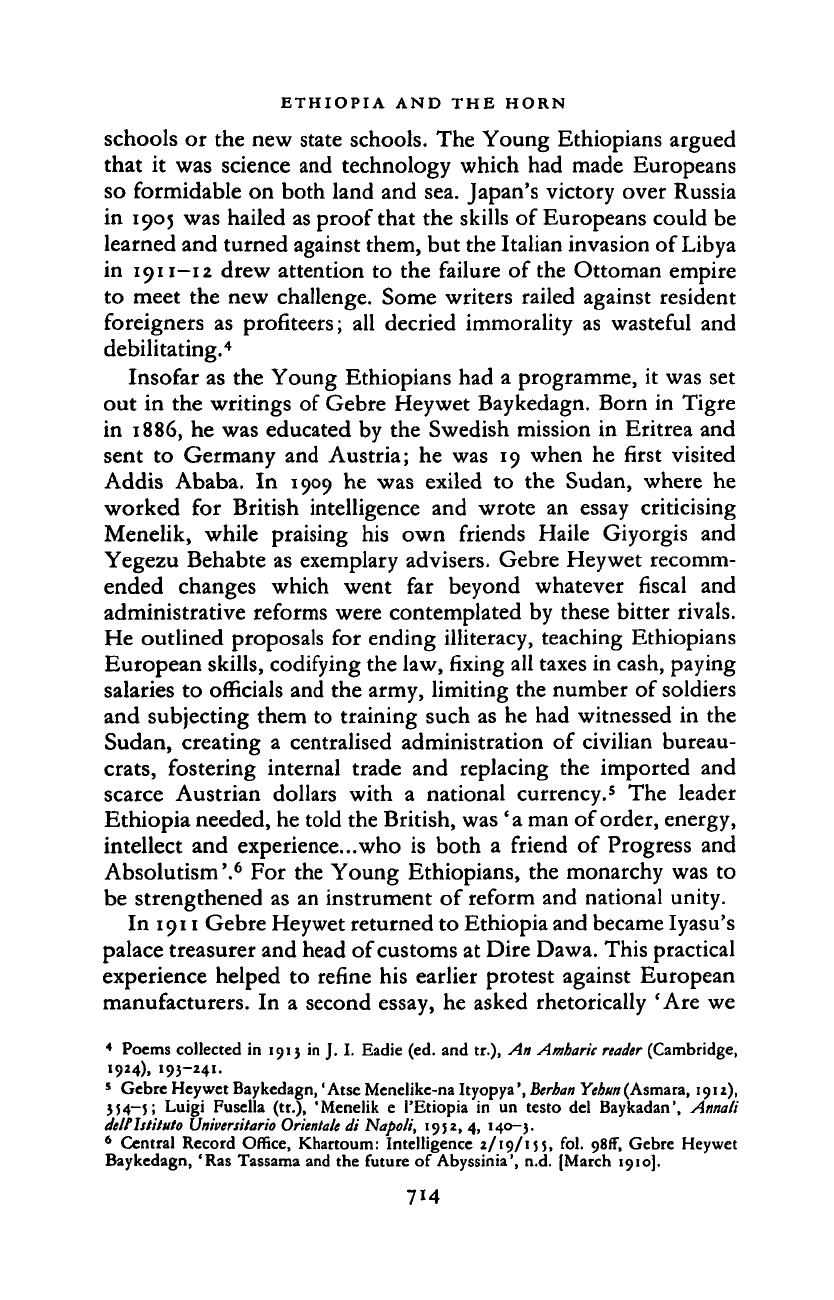
ETHIOPIA AND THE HORN
schools or the new state schools. The Young Ethiopians argued
that it was science and technology which had made Europeans
so formidable on both land and sea. Japan's victory over Russia
in 1905 was hailed as proof that the skills of Europeans could be
learned and turned against them, but the Italian invasion of Libya
in 1911-12 drew attention to the failure of the Ottoman empire
to meet the new challenge. Some writers railed against resident
foreigners as profiteers; all decried immorality as wasteful and
debilitating.
4
Insofar as the Young Ethiopians had a programme, it was set
out in the writings of Gebre Heywet Baykedagn. Born in Tigre
in 1886, he was educated by the Swedish mission in Eritrea and
sent to Germany and Austria; he was 19 when he first visited
Addis Ababa. In 1909 he was exiled to the Sudan, where he
worked for British intelligence and wrote an essay criticising
Menelik, while praising his own friends Haile Giyorgis and
Yegezu Behabte as exemplary advisers. Gebre Heywet recomm-
ended changes which went far beyond whatever fiscal and
administrative reforms were contemplated by these bitter rivals.
He outlined proposals for ending illiteracy, teaching Ethiopians
European skills, codifying the law, fixing all taxes in cash, paying
salaries to officials and the army, limiting the number of soldiers
and subjecting them to training such as he had witnessed in the
Sudan, creating a centralised administration of civilian bureau-
crats,
fostering internal trade and replacing the imported and
scarce Austrian dollars with a national currency.
5
The leader
Ethiopia needed, he told the British, was 'a man of order, energy,
intellect and experience...who is both a friend of Progress and
Absolutism'.
6
For the Young Ethiopians, the monarchy was to
be strengthened as an instrument of reform and national unity.
In 1911 Gebre Heywet returned to Ethiopia and became Iyasu's
palace treasurer and head of customs at Dire Dawa. This practical
experience helped to refine his earlier protest against European
manufacturers. In a second essay, he asked rhetorically 'Are we
4
Poems collected in 1913 in J. I. Eadie (ed. and tr.), An Ambaric reader (Cambridge,
19*4).
«93-*4«-
5
Gebre Heywet Baykedagn,' Atse Menelikc-na Ityopya',
Berban Yebun
(Asmara, 1912),
354-5;
Luigi Fusella (tr.), 'Menelik e l'Etiopia in un testo del Baykadan', Annali
deltlstituto Universitario
Orientate
di Napo/i, 1952, 4, 140-3.
6
Central Record Office, Khartoum: Intelligence 2/19/155, fol.
98ff,
Gebre Heywet
Baykedagn, 'Ras Tassama and the future of Abyssinia', n.d. [March
1910].
Cambridge Histories Online © Cambridge University Press, 2008
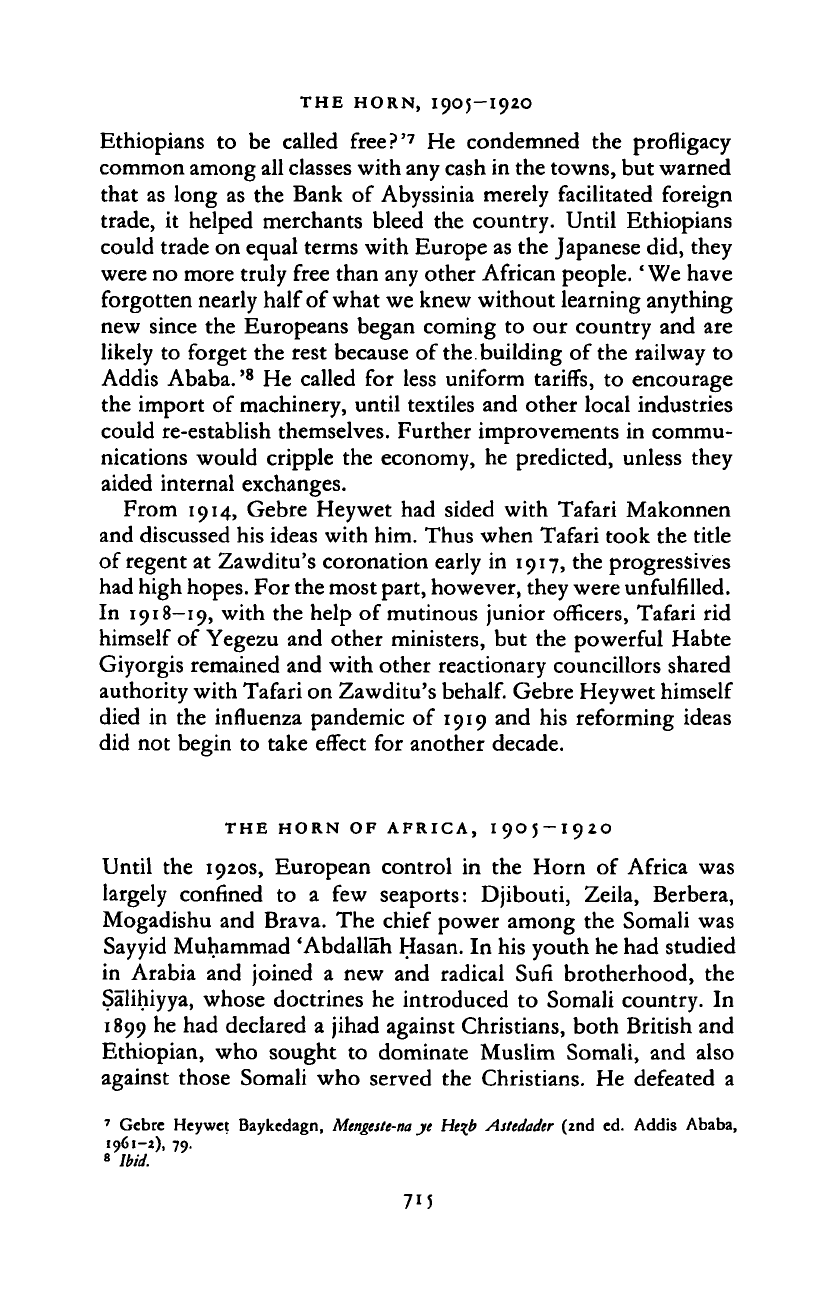
THE HORN, 1905—1920
Ethiopians
to be
called free?'
7
He
condemned the profligacy
common among all classes with any cash in the towns, but warned
that as long as the Bank
of
Abyssinia merely facilitated foreign
trade,
it
helped merchants bleed the country. Until Ethiopians
could trade on equal terms with Europe as the Japanese did, they
were no more truly free than any other African people.'
We
have
forgotten nearly half of what we knew without learning anything
new since the Europeans began coming to our country and are
likely to forget the rest because of the.building of the railway to
Addis Ababa.'
8
He called
for
less uniform tariff's,
to
encourage
the import of machinery, until textiles and other local industries
could re-establish themselves. Further improvements in commu-
nications would cripple the economy, he predicted, unless they
aided internal exchanges.
From 1914, Gebre Heywet had sided with Tafari Makonnen
and discussed his ideas with him. Thus when Tafari took the title
of regent at Zawditu's coronation early in 1917, the progressives
had high
hopes.
For the most part, however, they were unfulfilled.
In 1918-19, with the help of mutinous junior officers, Tafari rid
himself of Yegezu and other ministers, but the powerful Habte
Giyorgis remained and with other reactionary councillors shared
authority with Tafari on Zawditu's
behalf.
Gebre Heywet himself
died
in
the influenza pandemic
of
1919 and his reforming ideas
did not begin to take effect for another decade.
THE
HORN
OF
AFRICA,
1905-1920
Until the 1920s, European control
in
the Horn
of
Africa was
largely confined
to a few
seaports: Djibouti, Zeila, Berbera,
Mogadishu and Brava. The chief power among the Somali was
Sayyid Muhammad 'Abdallah Hasan. In his youth he had studied
in Arabia and joined
a
new and radical Sufi brotherhood,
the
Salihiyya, whose doctrines he introduced
to
Somali country.
In
1899 he had declared
a
jihad against Christians, both British and
Ethiopian, who sought
to
dominate Muslim Somali, and also
against those Somali who served the Christians. He defeated
a
7
Gebre Heywet
Baykedagn,
Mtngtstt-na
jt
Ht^b
Asttdader
(2nd
ed.
Addis
Ababa,
1961-2),
79.
8
Ibid.
715
Cambridge Histories Online © Cambridge University Press, 2008
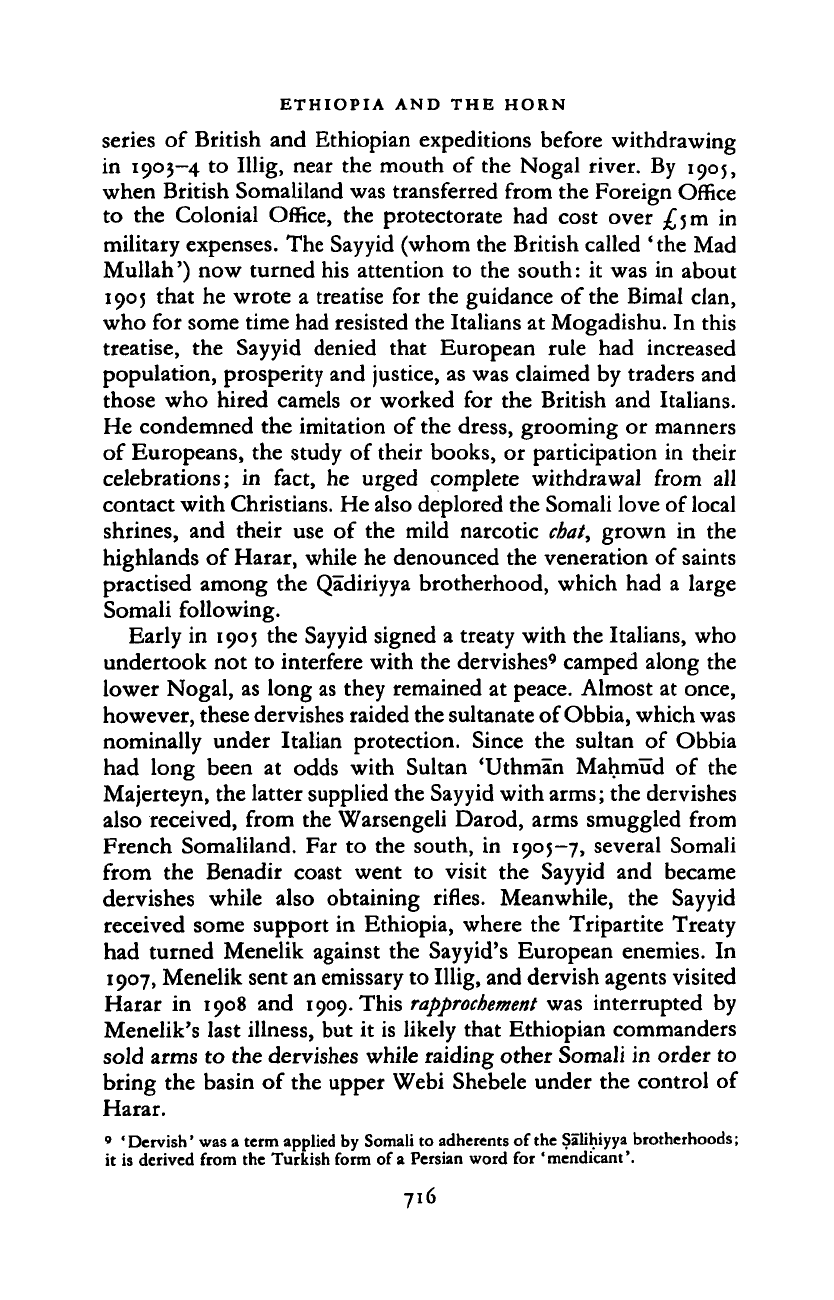
ETHIOPIA AND THE HORN
series of British and Ethiopian expeditions before withdrawing
in 1903—4 to Illig, near the mouth of the Nogal river. By 1905,
when British Somaliland was transferred from the Foreign Office
to the Colonial Office, the protectorate had cost over £$m in
military expenses. The Sayyid (whom the British called 'the Mad
Mullah') now turned his attention to the south: it was in about
1905 that he wrote a treatise for the guidance of the Bimal clan,
who for some time had resisted the Italians at Mogadishu. In this
treatise, the Sayyid denied that European rule had increased
population, prosperity and justice, as was claimed by traders and
those who hired camels or worked for the British and Italians.
He condemned the imitation of the dress, grooming or manners
of Europeans, the study of their books, or participation in their
celebrations; in fact, he urged complete withdrawal from all
contact with Christians. He also deplored the Somali love of local
shrines, and their use of the mild narcotic chat, grown in the
highlands of Harar, while he denounced the veneration of saints
practised among the Qadiriyya brotherhood, which had a large
Somali following.
Early in 1905 the Sayyid signed a treaty with the Italians, who
undertook not to interfere with the dervishes
9
camped along the
lower Nogal, as long as they remained at peace. Almost at once,
however, these dervishes raided the sultanate of Obbia, which was
nominally under Italian protection. Since the sultan of Obbia
had long been at odds with Sultan 'Uthman Mahmud of the
Majerteyn, the latter supplied the Sayyid with arms; the dervishes
also received, from the Warsengeli Darod, arms smuggled from
French Somaliland. Far to the south, in 1905—7, several Somali
from the Benadir coast went to visit the Sayyid and became
dervishes while also obtaining rifles. Meanwhile, the Sayyid
received some support in Ethiopia, where the Tripartite Treaty
had turned Menelik against the Sayyid's European enemies. In
1907,
Menelik sent an emissary to Illig, and dervish agents visited
Harar in 1908 and
1909.
This
rapprochement
was interrupted by
Menelik's last illness, but it is likely that Ethiopian commanders
sold arms to the dervishes while raiding other Somali in order to
bring the basin of the upper Webi Shebele under the control of
Harar.
» 'Dervish' was a term applied by Somali to adherents of the Salihiyya brotherhoods;
it is derived from the Turkish form of
a
Persian word for 'mendicant'.
716
Cambridge Histories Online © Cambridge University Press, 2008
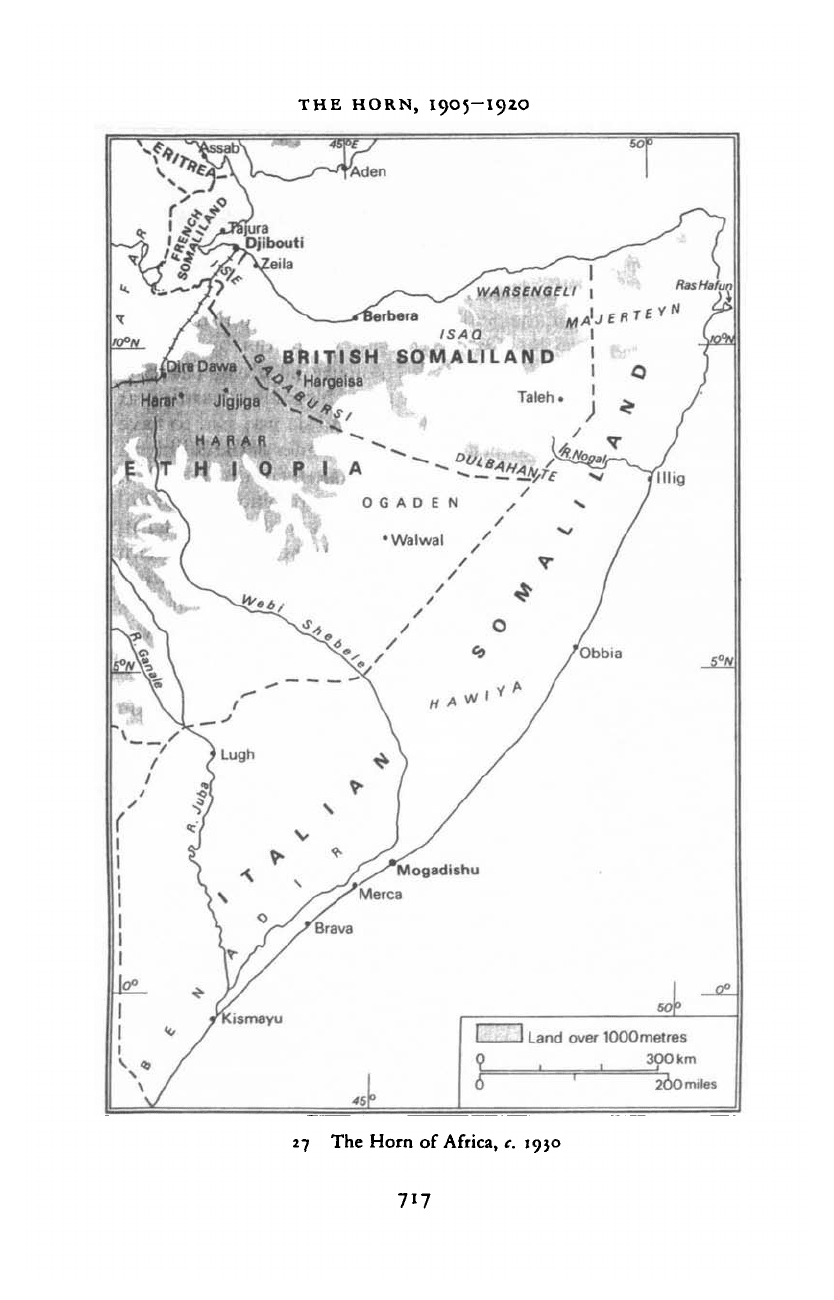
THE HORN, 1905 —I92O
•
WPN_
f
fftft)
vfc
(
A\
r'
<
1 ^
\*
/
^a
wmm
• .
W
3
1 0
G
A D
SOP
Taleh.
MA
JE
RT£VN
^
O )
) * /
4 V /
^
71 Nig
x /
*y.\
'Walwal
/
/
/
"
tf
' • /
o
/
\
\
k
+
V V \ y
/
/
/
/
/
7
/^
y\/^Mogadishu
\
\
/^/'Merca
\
V^ava
t^Kismayu
i
dD
Land
9
6
/
/
/Obbia
s0)V
sof>
over lOOOmetres
, ^00 km
260
miles
27 The Horn of Africa, c. 1950
717
Cambridge Histories Online © Cambridge University Press, 2008
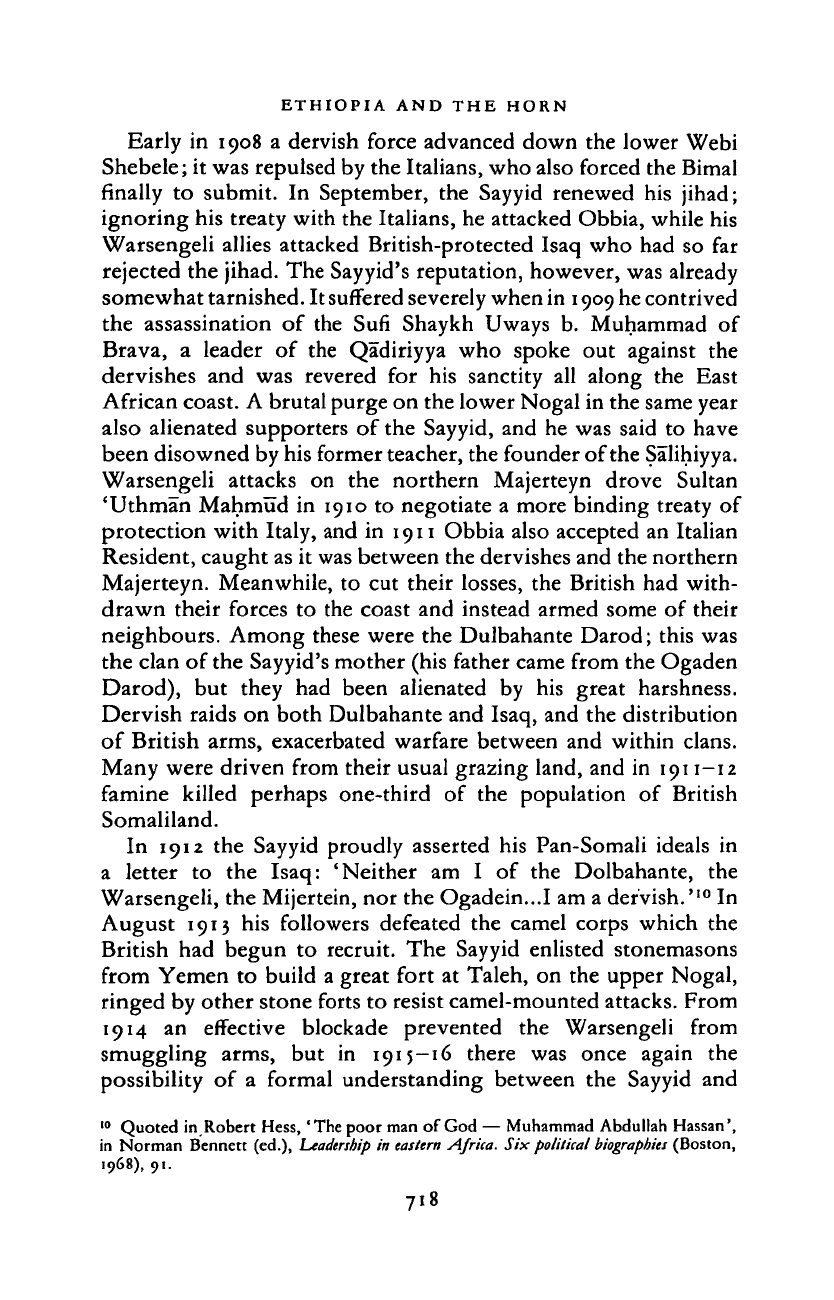
ETHIOPIA AND THE HORN
Early in 1908 a dervish force advanced down the lower Webi
Shebele; it was repulsed by the Italians, who also forced the Bimal
finally to submit.
In
September, the Sayyid renewed his jihad;
ignoring his treaty with the Italians, he attacked Obbia, while his
Warsengeli allies attacked British-protected Isaq who had so far
rejected the jihad. The Sayyid's reputation, however, was already
somewhat tarnished. It suffered severely when in
1909
he contrived
the assassination
of
the Sufi Shaykh Uways
b.
Muhammad
of
Brava,
a
leader
of
the Qadiriyya who spoke
out
against
the
dervishes and was revered
for
his sanctity
all
along the East
African coast. A brutal purge on the lower Nogal in the same year
also alienated supporters of the Sayyid, and he was said to have
been disowned by his former teacher, the founder of the Salihiyya.
Warsengeli attacks
on the
northern Majerteyn drove Sultan
'Uthman Mahmud in 1910 to negotiate a more binding treaty of
protection with Italy, and in 1911 Obbia also accepted an Italian
Resident, caught as it was between the dervishes and the northern
Majerteyn. Meanwhile, to cut their losses, the British had with-
drawn their forces to the coast and instead armed some of their
neighbours. Among these were the Dulbahante Darod; this was
the clan of the Sayyid's mother (his father came from the Ogaden
Darod),
but
they had been alienated
by his
great harshness.
Dervish raids on both Dulbahante and Isaq, and the distribution
of British arms, exacerbated warfare between and within clans.
Many were driven from their usual grazing land, and in 1911-12
famine killed perhaps one-third
of
the population
of
British
Somaliland.
In 1912 the Sayyid proudly asserted his Pan-Somali ideals
in
a letter
to the
Isaq: 'Neither
am I of
the Dolbahante,
the
Warsengeli, the Mijertein, nor the Ogadein...I am a dervish.'
10
In
August 1913 his followers defeated the camel corps which the
British had begun
to
recruit. The Sayyid enlisted stonemasons
from Yemen to build a great fort at Taleh, on the upper Nogal,
ringed by other stone forts to resist camel-mounted attacks. From
1914
an
effective blockade prevented
the
Warsengeli from
smuggling arms,
but in
1915-16 there
was
once again
the
possibility
of a
formal understanding between the Sayyid and
10
Quoted in Robert Hess, 'The poor man of God — Muhammad Abdullah Hassan',
in Norman Bennett (ed.),
Leadership
in
eastern
Africa. Six
political biographies
(Boston,
1968),
91.
718
Cambridge Histories Online © Cambridge University Press, 2008
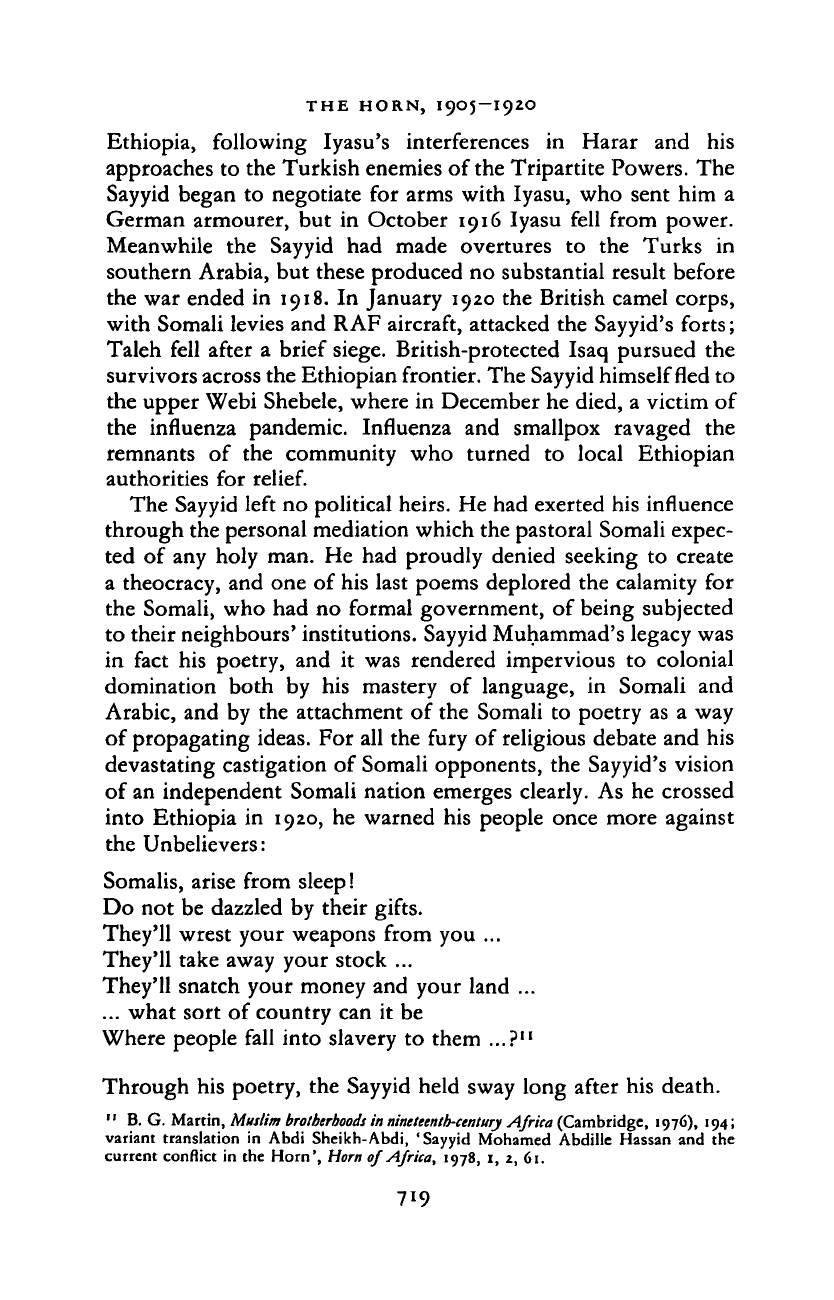
THE HORN, 1905-1920
Ethiopia, following Iyasu's interferences
in
Harar
and his
approaches to the Turkish enemies of the Tripartite Powers. The
Sayyid began
to
negotiate
for
arms with Iyasu, who sent him
a
German armourer, but
in
October 1916 Iyasu fell from power.
Meanwhile
the
Sayyid
had
made overtures
to the
Turks
in
southern Arabia, but these produced no substantial result before
the war ended
in
1918.
In
January 1920 the British camel corps,
with Somali levies and RAF aircraft, attacked the Sayyid's forts;
Taleh fell after
a
brief siege. British-protected Isaq pursued
the
survivors across the Ethiopian frontier. The Sayyid himself
fled
to
the upper Webi Shebele, where in December he died,
a
victim of
the influenza pandemic. Influenza
and
smallpox ravaged
the
remnants
of the
community
who
turned
to
local Ethiopian
authorities
for
relief.
The Sayyid left no political heirs. He had exerted his influence
through the personal mediation which the pastoral Somali expec-
ted
of
any holy man. He had proudly denied seeking
to
create
a theocracy, and one
of
his last poems deplored the calamity
for
the Somali, who had no formal government,
of
being subjected
to their neighbours' institutions. Sayyid Muhammad's legacy was
in fact
his
poetry,
and it
was rendered impervious
to
colonial
domination both
by his
mastery
of
language,
in
Somali
and
Arabic, and by the attachment
of
the Somali
to
poetry as
a
way
of propagating ideas. For all the fury
of
religious debate and his
devastating castigation
of
Somali opponents, the Sayyid's vision
of an independent Somali nation emerges clearly. As he crossed
into Ethiopia
in
1920,
he
warned his people once more against
the Unbelievers:
Somalis, arise from sleep!
Do not be dazzled by their gifts.
They'll wrest your weapons from you
...
They'll take away your stock
...
They'll snatch your money and your land
...
... what sort
of
country can
it
be
Where people fall into slavery
to
them ...?"
Through his poetry, the Sayyid held sway long after his death.
11
B.
G.
Martin, Muslim
brotherhoods
in
nineteenth-century
Africa (Cambridge, 1976), 194;
variant translation
in
Abdi Sheikh-Abdi, 'Sayyid Mohamed Abdille Hassan and
the
current conflict
in
the Horn', Horn
of
Africa, 1978,
1, 2,
61.
719
Cambridge Histories Online © Cambridge University Press, 2008
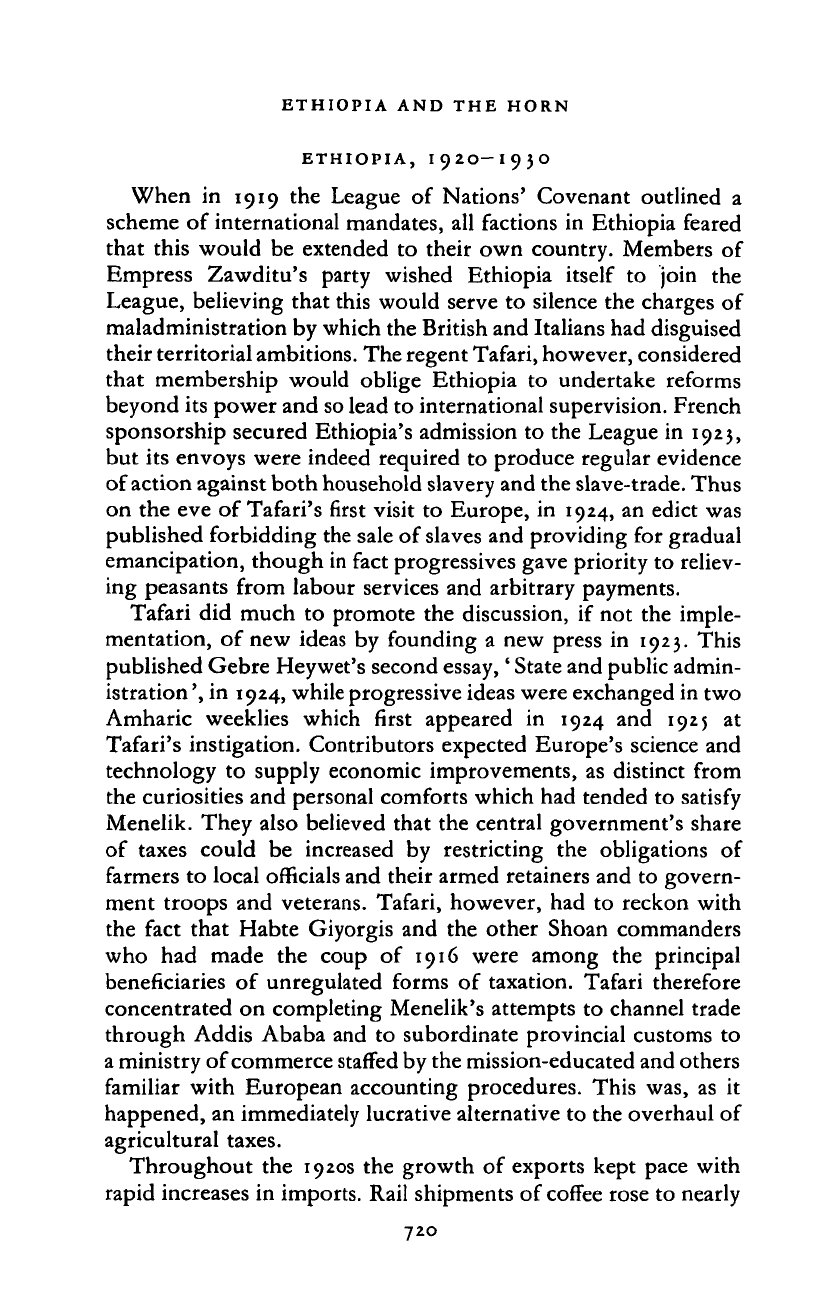
ETHIOPIA AND THE HORN
ETHIOPIA, 1920-1930
When in 1919 the League of Nations' Covenant outlined a
scheme of international mandates, all factions in Ethiopia feared
that this would be extended to their own country. Members of
Empress Zawditu's party wished Ethiopia itself to join the
League, believing that this would serve to silence the charges of
maladministration by which the British and Italians had disguised
their territorial
ambitions.
The regent Tafari, however, considered
that membership would oblige Ethiopia to undertake reforms
beyond its power and so lead to international supervision. French
sponsorship secured Ethiopia's admission to the League in 1923,
but its envoys were indeed required to produce regular evidence
of action against both household slavery and the slave-trade. Thus
on the eve of Tafari's first visit to Europe, in 1924, an edict was
published forbidding the sale of slaves and providing for gradual
emancipation, though in fact progressives gave priority to reliev-
ing peasants from labour services and arbitrary payments.
Tafari did much to promote the discussion, if not the imple-
mentation, of new ideas by founding a new press in 1923. This
published Gebre Heywet's second essay,' State and public admin-
istration ', in 1924, while progressive ideas were exchanged in two
Amharic weeklies which first appeared in 1924 and 1925 at
Tafari's instigation. Contributors expected Europe's science and
technology to supply economic improvements, as distinct from
the curiosities and personal comforts which had tended to satisfy
Menelik. They also believed that the central government's share
of taxes could be increased by restricting the obligations of
farmers to local officials and their armed retainers and to govern-
ment troops and veterans. Tafari, however, had to reckon with
the fact that Habte Giyorgis and the other Shoan commanders
who had made the coup of 1916 were among the principal
beneficiaries of unregulated forms of taxation. Tafari therefore
concentrated on completing Menelik's attempts to channel trade
through Addis Ababa and to subordinate provincial customs to
a ministry of commerce staffed by the mission-educated and others
familiar with European accounting procedures. This was, as it
happened, an immediately lucrative alternative to the overhaul of
agricultural taxes.
Throughout the 1920s the growth of exports kept pace with
rapid increases in imports. Rail shipments of coffee rose to nearly
720
Cambridge Histories Online © Cambridge University Press, 2008
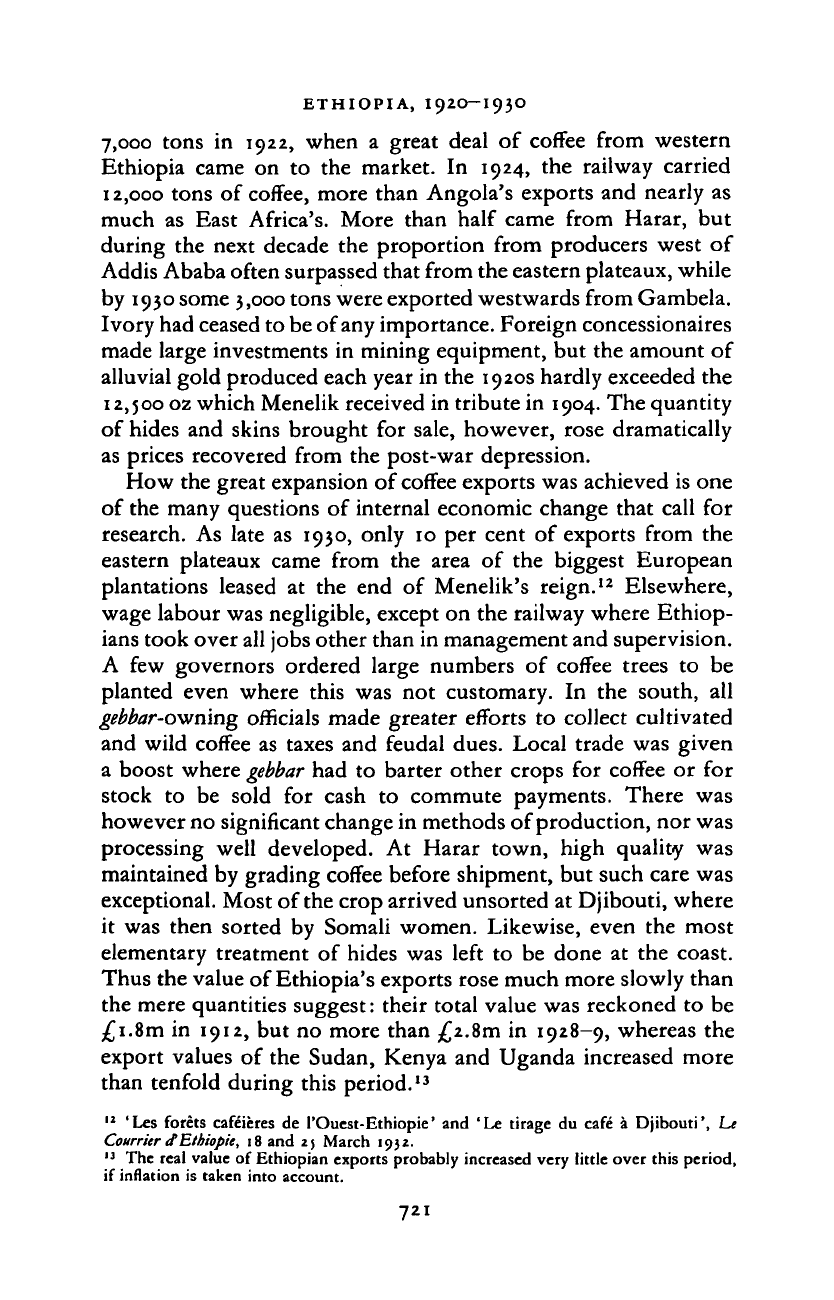
ETHIOPIA, 1920-1930
7,000 tons
in
1922, when
a
great deal
of
coffee from western
Ethiopia came
on to the
market.
In
1924,
the
railway carried
12,000 tons of coffee, more than Angola's exports and nearly as
much
as
East Africa's. More than half came from Harar,
but
during the next decade the proportion from producers west
of
Addis Ababa often surpassed that from the eastern plateaux, while
by
1930
some 3,000 tons were exported westwards from Gambela.
Ivory had ceased to be of any importance. Foreign concessionaires
made large investments in mining equipment, but the amount of
alluvial gold produced each year in the 1920s hardly exceeded the
12,500 oz which Menelik received in tribute in 1904. The quantity
of hides and skins brought
for
sale, however, rose dramatically
as prices recovered from the post-war depression.
How the great expansion of coffee exports was achieved is one
of the many questions
of
internal economic change that call
for
research. As late as 1930, only 10 per cent
of
exports from the
eastern plateaux came from
the
area
of
the biggest European
plantations leased
at the end of
Menelik's reign.
12
Elsewhere,
wage labour was negligible, except on the railway where Ethiop-
ians took over all jobs other than in management and supervision.
A
few
governors ordered large numbers
of
coffee trees
to be
planted even where this was
not
customary.
In the
south,
all
gebbar-o-wning
officials made greater efforts
to
collect cultivated
and wild coffee as taxes and feudal dues. Local trade was given
a boost where
gebbar
had
to
barter other crops
for
coffee
or for
stock
to be
sold
for
cash
to
commute payments. There
was
however no significant change in methods of production, nor was
processing well developed.
At
Harar town, high quality
was
maintained by grading coffee before shipment, but such care was
exceptional. Most of the crop arrived unsorted at Djibouti, where
it was then sorted
by
Somali women. Likewise, even the most
elementary treatment
of
hides was left
to be
done
at
the coast.
Thus the value of Ethiopia's exports rose much more slowly than
the mere quantities suggest: their total value was reckoned to be
£i.8m in 1912, but no more than £1.8m
in
1928-9, whereas the
export values
of
the Sudan, Kenya and Uganda increased more
than tenfold during this period.
13
12
'Les
forets cafeieres
de
l'Ouest-Ethiopie'
and 'Le
tirage
du
cafe
a
Djibouti',
Le
Courritr ttElhiopie,
18 and 25
March 19}
2.
13
The
real value
of
Ethiopian exports probably increased very little over this period,
if inflation
is
taken into account.
721
Cambridge Histories Online © Cambridge University Press, 2008
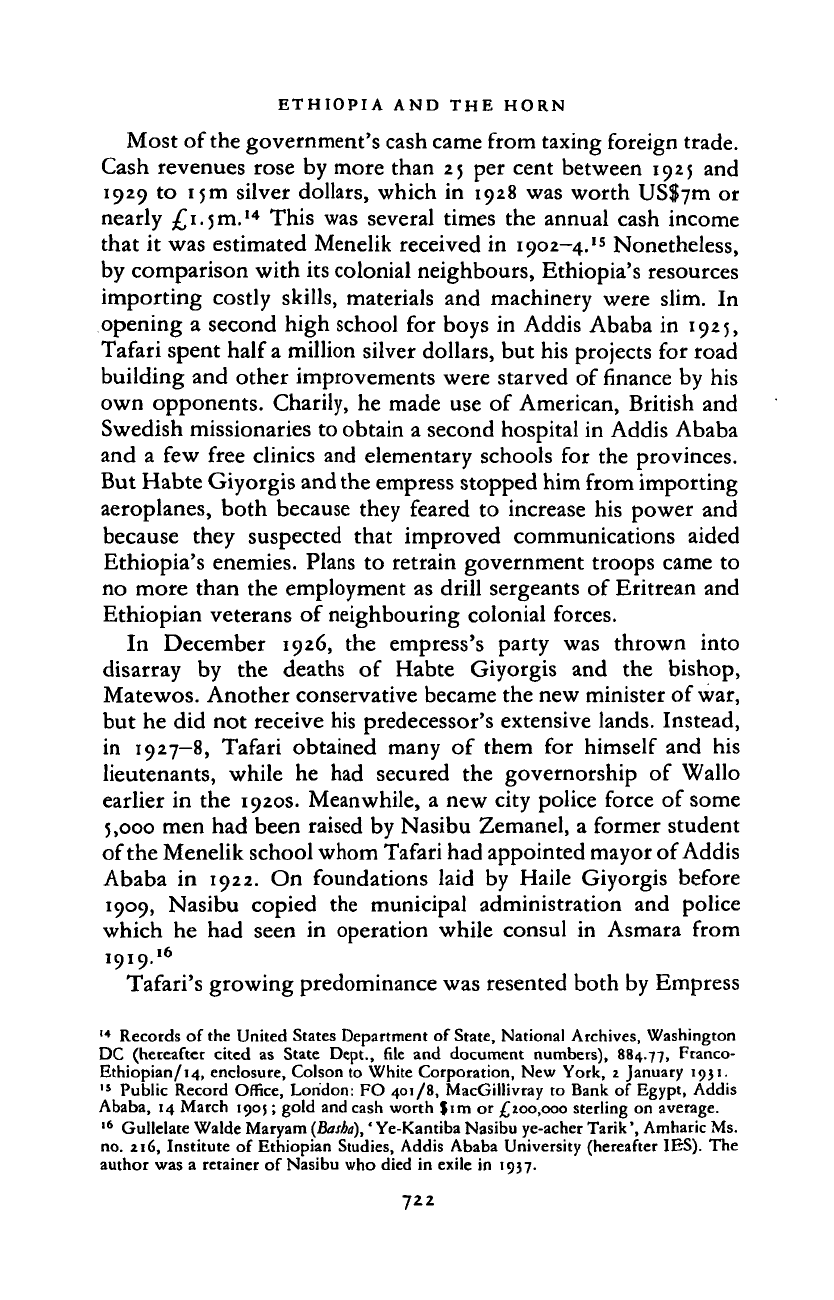
ETHIOPIA AND THE HORN
Most of the government's cash came from taxing foreign trade.
Cash revenues rose by more than 25 per cent between 1925
and
1929
to
15m silver dollars, which
in
1928 was worth US$7tn
or
nearly {1.5m.
14
This was several times the annual cash income
that
it
was estimated Menelik received in 1902-4.
IS
Nonetheless,
by comparison with its colonial neighbours, Ethiopia's resources
importing costly skills, materials
and
machinery were slim.
In
opening
a
second high school for boys
in
Addis Ababa in 1925,
Tafari spent half
a
million silver dollars, but his projects for road
building and other improvements were starved
of
finance by his
own opponents. Charily,
he
made use
of
American, British and
Swedish missionaries to obtain a second hospital in Addis Ababa
and
a
few free clinics and elementary schools
for
the provinces.
But Habte Giyorgis and the empress stopped him from importing
aeroplanes, both because they feared
to
increase his power and
because they suspected that improved communications aided
Ethiopia's enemies. Plans
to
retrain government troops came
to
no more than the employment as drill sergeants
of
Eritrean and
Ethiopian veterans
of
neighbouring colonial forces.
In December 1926,
the
empress's party
was
thrown into
disarray
by the
deaths
of
Habte Giyorgis
and the
bishop,
Matewos. Another conservative became the new minister of war,
but he did not receive his predecessor's extensive lands. Instead,
in 1927—8, Tafari obtained many
of
them
for
himself and
his
lieutenants, while
he had
secured
the
governorship
of
Wallo
earlier
in
the 1920s. Meanwhile,
a
new city police force
of
some
5,000
men had been raised by Nasibu Zemanel,
a
former student
of the Menelik school whom Tafari had appointed mayor of Addis
Ababa
in
1922.
On
foundations laid
by
Haile Giyorgis before
1909,
Nasibu copied
the
municipal administration
and
police
which
he had
seen
in
operation while consul
in
Asmara from
1919.
16
Tafari's growing predominance was resented both by Empress
14
Records
of
the United States Department of State, National Archives, Washington
DC (hereafter cited
as
State Dcpt., file
and
document numbers), 884.77, Franco-
Ethiopian/14, enclosure, Colson to White Corporation, New York, 2 January 1931.
15
Public Record Office, London: FO 401/8, MacGillivray
to
Bank
of
Egypt, Addis
Ababa, 14 March 1905; gold and cash worth Jim
or
£200,000 sterling on average.
16
Gullelate Walde Maryam
(Basha),'
Ye-Kantiba Nasibu ye-acher Tarik', Amharic Ms.
no.
216, Institute
of
Ethiopian Studies, Addis Ababa University (hereafter IES). The
author was
a
retainer
of
Nasibu who died
in
exile
in
1937.
722
Cambridge Histories Online © Cambridge University Press, 2008
